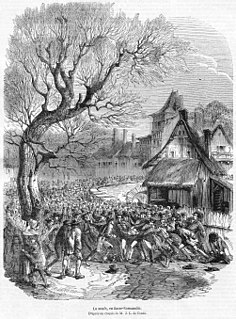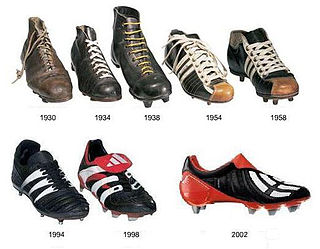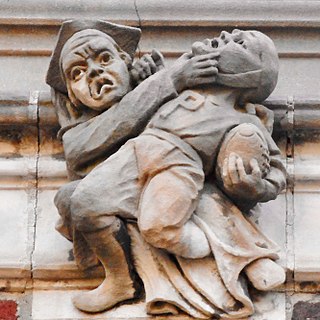
Rugby football is a collective name for the team sports of rugby union and rugby league, as well as the earlier forms of football from which both games evolved. Canadian football, and to a lesser extent American football were also broadly considered forms of rugby football but are seldom now referred to as such.

Adidas AG is a multinational corporation, founded and headquartered in Herzogenaurach, Germany, that designs and manufactures shoes, clothing and accessories. It is the largest sportswear manufacturer in Europe, and the second largest in the world, after Nike. It is the holding company for the Adidas Group, which consists of the Reebok sportswear company, 8.33% of the German football club Bayern Munich, and Runtastic, an Austrian fitness technology company. Adidas' revenue for 2018 was listed at €21.915 billion.
In professional sports, a salary cap is an agreement or rule that places a limit on the amount of money that a team can spend on players' salaries. It exists as a per-player limit or a total limit for the team's roster, or both. Several sports leagues have implemented salary caps, using it to keep overall costs down, and also to maintain a competitive balance by restricting richer clubs from entrenching dominance by signing many more top players than their rivals. Salary caps can be a major issue in negotiations between league management and players' unions because they limit players' and teams' ability to negotiate higher salaries even if a team is operating at significant profits, and have been the focal point of several strikes by players and lockouts by owners and administrators.

Professional sports, as opposed to amateur sports, are sports in which athletes receive payment for their performance. Professional athleticism has come to the fore through a combination of developments. Mass media and increased leisure have brought larger audiences, so that sports organizations or teams can command large incomes. As a result, more sportspeople can afford to make athleticism their primary career, devoting the training time necessary to increase skills, physical condition, and experience to modern levels of achievement. This proficiency has also helped boost the popularity of sports.

Amateur sports are sports in which participants engage largely or entirely without remuneration. The distinction is made between amateur sporting participants and professional sporting participants, who are paid for the time they spend competing and training. In the majority of sports which feature professional players, the professionals will participate at a higher standard of play than amateur competitors, as they can train full-time without the stress of having another job. The majority of worldwide sporting participants are amateurs.

The history of rugby union follows from various football games long before the 19th century, but it was not until the middle of that century that the rules were formulated and codified. The code of football later known as rugby union can be traced to three events: the first set of written rules in 1845, the Blackheath Club's decision to leave the Football Association in 1863 and the formation of the Rugby Football Union in 1871. The code was originally known simply as "rugby football". It was not until a schism in 1895, over the payment of players, which resulted in the formation of the separate code of rugby league, that the name "rugby union" was used to differentiate the original rugby code. For most of its history, rugby was a strictly amateur football code, and the sport's administrators frequently imposed bans and restrictions on players who they viewed as professional. It was not until 1995 that rugby union was declared an "open" game, and thus professionalism was sanctioned by the code's governing body, World Rugby—then known as the International Rugby Football Board (IRFB).

The history of rugby league as a separate form of rugby football goes back to 1895 in Huddersfield, West Riding of Yorkshire when the Northern Rugby Football Union broke away from England's established Rugby Football Union to administer its own separate competition. Similar schisms occurred later in Australia and New Zealand in 1907. Gradually the rugby played in these breakaway competitions evolved into a distinctly separate sport that took its name from the professional leagues that administered it. Rugby league in England went on to set attendance and player payment records and rugby league in Australia became the most watched sport on television. The game also developed a significant place in the culture of France, New Zealand and several other Pacific Island nations, such as Papua New Guinea, where it has become the national sport.
Semi-professional sports are sports in which athletes are not participating on a full-time basis. Semi-professionals are not amateur because they receive regular payment from their team (company), but at a much lower rate than a full-time professional athlete. As a result, players may have full-time employment elsewhere. A semipro player/team could also be one that represents a place of employment that only the employees are allowed to play on. In this case, it is considered semipro because their employer pays them, but for their regular job, not for playing on the company's team.

Sport in the United Kingdom plays an important role in British culture. The United Kingdom has given birth to a range of major international sports including association football, badminton, billiards, bowls, boxing, cricket, croquet, curling, darts, golf, fives, hockey, netball, rugby, tennis, table tennis, snooker, squash, and water polo. The standardisation of various sports, such as in rowing, dancesports and motorsports occurred in the United Kingdom.

London Welsh Rugby Football Club was a rugby union club formed in 1885. Based in Old Deer Park, Richmond-upon-Thames, London Welsh RFC played in the English Premiership in the 2012–13 and 2014–15 seasons, after gaining promotion from the RFU Championship in the 2012 and 2014 play-off final. The club returned to Old Deer Park in 2015 after three seasons at the Kassam Stadium, Oxford.

Football boots, called cleats or soccer shoes in North America, are an item of footwear worn when playing football. Those designed for grass pitches have studs on the outsole to aid grip. From simple and humble beginnings football boots have come a long way and today find themselves subject to much research, development, sponsorship and marketing at the heart of a multi-national global industry. Modern "boots" are not truly boots in that they do not cover the ankle - like most other types of specialist sports footwear, their basic design and appearance has converged with that of sneakers since the 1960s.

College athletics in the United States or college sports in the United States refers primarily to sports and athletic competition organized and funded by institutions of tertiary education.

Rugby league is played across England but is most popular in Northern England, especially Yorkshire and Lancashire where the game originated. These areas are the heartland of rugby league. The sport is also popular in Cumbria where the amateur game is particularly powerful.
Rugby league is a sport played in Wales. The governing body of the game in Wales is the Wales Rugby League.

Rugby union in England is one of the leading professional and recreational team sports. In 1871 the Rugby Football Union, the governing body for rugby union in England, was formed by 21 rugby clubs, and the first international match, which involved England, was played in Scotland. The English national team compete annually in the Six Nations Championship, and are former world champions after winning the 2003 Rugby World Cup. The top domestic men's club competition is Premiership Rugby, and English clubs also compete in international competitions such as the European Rugby Champions Cup. The top domestic women's competition is the Premier 15s.
The team sports rugby league and rugby union have shared origins and thus many similarities.
Sport industry is a market in which people, activities, business, and organizations are involved in producing, facilitating, promoting, or organizing any activity, experience, or business enterprise focused on sports. It is the market in which the businesses or products offered to its buyers are sports related and may be goods, services, people, places, or ideas.
The Welsh League was the first club rugby league competition in Wales. Its inaugural season was in 1908/09 when four additional teams were formed to join Ebbw Vale RLFC and Merthyr Tydfil RLFC, which allowed a league tournament to take place. The Welsh League ran for just two seasons, after three of the teams, Aberdare, Barry and Mid-Rhondda left the Northern Union and ceased playing rugby in the first season; followed by the collapse of Treherbert in 1910. Both seasons were won by Ebbw Vale.
Merthyr Tydfil Rugby League Football Club was a professional rugby league club based in Merthyr Tydfil, Wales playing in the Welsh League and Northern Union. Based at College Field, Merthyr Tydfil were one of the first professional Welsh teams, and folded in 1911 after the failure of the Welsh League. Merthyr Tydfil produced five players who would go on to represent the Wales national rugby league team, and in the 1908-09 season finished eighth in the Northern League, the best result achieved by any of the first six professional Welsh teams.
The Welsh–Scottish League was a rugby union league in Scotland and Wales jointly implemented by the Scottish Rugby Union and the Welsh Rugby Union from the 1999–2000 season onwards. It was a precursor to the Celtic League and lasted three seasons, being disbanded after the Celtic League was set up.











